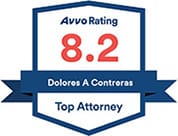Protecting Your Community And Separate Property Interests In A High Net Worth Divorce
Over the course of your marriage, you and your spouse may have experienced a great deal of success in life. You may have a wonderful family, the house of your dreams and own a business that is looked upon as the leader of its industry. You and your spouse have made sound investments, and have ensured that your children will have a future that can provide them with everything that they will ever need.
Despite the seemingly perfect marriage, unexpected events can happen that can turn your entire life upside down. When you or your spouse decides to file for divorce, it is important to realize that it is up to you to protect yourself during this process. No matter how kind your spouse may be during the divorce, you need to know your options. It is important to know for the sake of your family and your business what the likely scenario of a divorce entails for your future.
At Contreras Law Firm, in San Diego, our experienced attorneys are here to help with your high-asset divorce. We can immediately develop a strategy that ensures you receive the property that you are entitled to under California’s community property laws.
What Makes High-Asset Divorce Different?
The issues in a high-asset divorce are very similar to those in other divorces, but the stakes are much higher. The more assets that a couple owns, the more difficult it can be to work toward a solution that each side finds reasonable. Some of the issues that cause problems in these divorces include:
- Determining the value of retirement assets, including IRAs, 401(k) accounts and other investments accumulated during the marriage
- Assessing the value of a business or business interests owned by one or both spouses
- Dividing the marriage debts equally between the spouses
- Deciding what to do with the couple’s home, the equity in the home or the outstanding mortgage balance
- If one spouse had property prior to marriage, separate property, determining if the other spouse has any interest in that separate property
Community property laws state that marital property should be divided equally between the spouses. You have to be sure that your property division agreement is an accurate reflection of what you should receive from the divorce. These may be very contentious discussions, but we will be here to make sure that you have an advocate working toward achieving results.
What Are Some Of The Most Common Problems In High-Asset Divorces?
Time and time again, we see many of the same issues causing problems in divorce discussions. We want to take a moment to discuss these matters, and also tell you how we can help you move past these issues and reach an agreement that is in your best interests.
Concealing Or Hiding Property
In many of these divorces, a spouse may try to hide or conceal assets. This means that your spouse will underreport income or pass along property to others to try to show that he or she has fewer assets than originally believed. This is especially true when one of the spouses is self-employed.
We work with experts to determine the amount of income that your spouse has accumulated during the marriage. We examine all tax records, bank statements and credit card statements to make sure that we have a clear picture.
Deciding What Will Happen To A Business
Often it is best to continue with the business so that there is enough income for support, however, it is important to decide who will be operating the business. More often than not, if only one spouse ran the business the majority of the time, that spouse would end up with the business. However, the spouse that is not operating the business may be entitled to profits and/or spousal support.
We will make sure that the business receives a full valuation, including an income valuation to determine the spouse’s income from the business, by using experienced professionals, and determine what your share of the company is worth.
Long-Term Spousal Support
Long-term spousal support usually refers to spousal support when parties have been married for 10 years or more. People mistakenly believe that just because you have been married for 10 years or more you will have to pay spousal support for life. This is not necessarily true.
Unlike short-term divorces (10 years or less), where the court usually awards spousal support for half the length of the marriage, in long-term marriages, the court retains jurisdiction over spousal support. Retaining jurisdiction means that the court will not put an end date to support, however, either side can go back to court throughout the years to increase or decrease spousal support.
If you are going through a divorce and will be requesting or paying spousal support, it is important to hire experienced attorneys who can evaluate your situation, especially when you consider the fact that there will most likely be two households that need to be maintained.
We help with both sides of spousal support requests. Our team will carefully evaluate your situation to learn what may happen in your case. We make sure that you know exactly what will happen with your finances after a divorce is final so that you can be prepared to take the next steps.
Why Contreras Law Firm Is The Right Call
We know that these are very sensitive issues. We work discretely to come to an agreement when it is in your best interests. When you need a team to fight for you in court, we have the experience that you can rely upon to get results at trial. We care a great deal about your case, and we will make sure that you get the chance to receive your full share of your marital property.
Seeking The Best Possible Outcome On Your Behalf
Contact our office in San Diego to discuss your high net worth questions with a lawyer. We offer a no-obligation preliminary consultation to all new clients. We listen carefully to your concerns and fully explain your legal options. You can contact us by calling 619-908-1495 or completing our online intake form to schedule an appointment.













